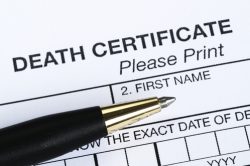Who Is the Person That Files a Death Certificate?

1. Medical professionals:
In most cases, the initial responsibility of filing a death certificate falls on medical professionals. If the death occurs in a hospital, nursing home, or under a physician’s care, a doctor or medical examiner is typically responsible for completing and signing the death certificate. This professional has firsthand knowledge of the cause of death and other medical information necessary for the accurate completion of the document.
2. Funeral directors:
Funeral directors play a crucial role in the process of filing a death certificate. Often, they work closely with medical professionals to ensure that all the necessary information is gathered and properly recorded on the certificate. Funeral directors are well-versed in the legal requirements and procedures related to death certificates and can assist families in navigating the process.
3. Next of kin or immediate family members:
While medical professionals and funeral directors are typically involved in filing the death certificate, it is ultimately the responsibility of the deceased person’s next of kin or immediate family members. This includes spouses, children, parents, or siblings. These family members are usually required to provide personal information about the deceased, such as their full name, date of birth, social security number, occupation, and address.
4. Legal representatives:
In some cases, if the deceased does not have any immediate family members or if there is a dispute regarding the completion of the death certificate, legal representatives may step in. This can include attorneys, executors of the deceased person’s estate, or individuals with power of attorney. Legal representatives ensure that all necessary legal requirements are met and that the death certificate accurately reflects the deceased person’s information.
5. The process of filing a death certificate:
The process of filing a death certificate varies from state to state, but generally involves the following steps:
Obtain a death pronouncement: The first step in filing a death certificate is to have a medical professional pronounce the person deceased and determine the cause of death. This is usually done by a doctor or medical examiner.
Contact a funeral director: Once the death has been pronounced, contact a funeral director who will guide you through the necessary paperwork and assist in filing the death certificate. They may request information about the deceased, such as their social security number, date of birth, and occupation.
Gather necessary documents: To file the death certificate, you will need certain documents, such as the deceased person’s identification, social security number, and any additional legal documents required by your state.
Complete the death certificate form: The funeral director or the family member responsible for filing the death certificate will complete the necessary forms with accurate information about the deceased person.
Obtain the necessary signatures: The completed death certificate must be signed by a medical professional who has knowledge of the cause of death. It is important to ensure that all required signatures and information are included.
File the death certificate: Once the death certificate is completed and signed, it must be filed with the applicable government agency, usually the local registrar of vital statistics or county clerk’s office. This can typically be done in person or by mail.
Conclusion:
Filing a death certificate is an important step in the legal process following the death of a loved one. While medical professionals and funeral directors play significant roles in completing and providing information for the death certificate, it ultimately falls on the next of kin or immediate family members to file the document. Understanding the process involved can help alleviate some of the stress during an already difficult time and ensure that all necessary legal requirements are met.
Got Questions? Let Us Help
Categorised in: Death Certificates
